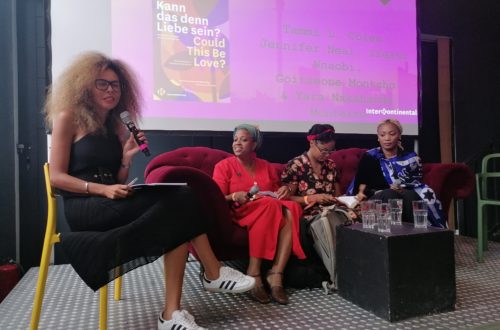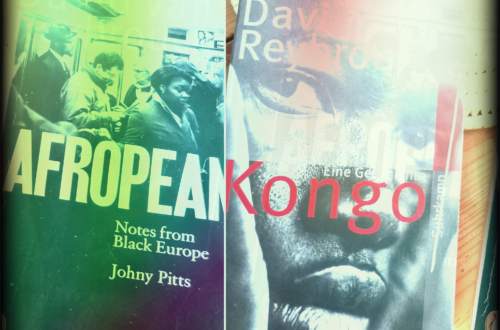
Barefoot in Germany – Double Review/Zwei Rezensionen
Barefoot in Germany ist der Kurzroman der Ruandisch-deutschen Autorin Tete Loeper. Er erscheint diesen Monat auf Englisch. Für cultureafrica.net hat ihn außerdem Lorna Likiza aus Kenia rezensiert, ihre Rezension erscheint gleichzeitig auf dieser Seite. Es gibt also den deutschen und kenianischen Blick auf dieses Buch.
for English Version scroll down
Barefoot in Germany is the short novel by Rwandan-German author Tete Loeper. It is published in English this month. Lorna Likiza from Kenya has also reviewed it for cultureafrica.net, and her review appears on this page at the same time. So there is the German and Kenyan view of this book.

Barefoot in Germany
Kurzroman von Tete Loeper
Rezension von Hans Hofele
Mit einem knalligen Anfang zieht uns Tete Loeper in ihr Romandebüt “Barefoot in Germany” in das Buch hinein. Und nimmt eine Schlüsselszene im Leben der Hauptfigur Mutoni vorweg. Es ist eine brutale Szene gleich am Anfang:
Whack! The first hit. Powerful, hot pain seared from my back.
Whack! This time it struck my shoulders. I cried.
I begged him to stop but instead he kept beating me harder.
I choked my scream. Hearing it made him angrier.
It was only when he heard me gasp for air that he called “Ligaya.”
“Yes sir,” she answered from the kitchen.
“Clean up this mess,” he said coldly, as if he wanted her to sweep the floor.Wir können es noch nicht einordnen, aber als geübte Leser und Leserin ist man nun auf der Hut. Bis zu dieser Szene in Hamburg führt Tete Loeper die Hauptfigur in ihrem Heimatland Rwanda ein. Auch hier gibt es Schlüsselszenen, wie die, als ihre (bereits verstorbene) Mutter den Mann trifft, der später mit ihr die Tochter und zeugt, die in Hamburg strandet.
Der Roman ist in der Ich-Person erzählt und beginnt in der Hauptstadt Rwandas, Kigali. Toni schlägt sich mit Mutter Niere und Schwester Tendeza durchs Leben. Tonis Vater wollte von der Mutter nur eine Affäre, wollte sich zwar um alles kümmern, ist dann aber auch nur der Freier, der die Frau bezahlt. Die bittere Erkenntnis, daß die Männer erst in Rwanda, später in Deutschland hauptsächlich am Körper, nicht am Leben der Frauen interessiert sind, muß nach der Mutter dann auch Tochter Toni machen.
Nachdem die Mutter stirbt, schweißt dies komischerweise die Schwestern im nun einsetztenden Lebenskampf nicht zusammen. Die ältere Schwester macht sich bald in den Ort der Verheißung, Dubai aus dem Staub. Was genau sie dort macht, erfahren wir nicht. Doch von nun an ist es auch Toni klar, sie will ihr Glück auch anderswo suchen.
Als sich ihre ruandische Schulfreundin Sonia aus Deutschland meldet, will nun auch Toni dorthin. Nachbarn und Bekannte raten ihr davon ab, es gäbe Gerüchte, Sonia arbeitet dort als “malaya”, als Prostituierte. Toni entgegnet auf Nachfragen:
I explained to her that Dubai is not Germany, that now we were talking about Europe,
where she lives.
“Aunty, Europe. Iburayi,” I said, looking into her eyes to ensure she understood that it
was not Africa we were discussing.
“Yes, of course I know Germany. The country that won the world cup in football.
Right?”
Toni geht auf das Angebot ein, sich von Sonia in Hamburg einen Partner suchen zu lassen. Soweit ist der Frustationsgrad bisweilen bei ihr angekommen. Und, ich sagte es bereits, es schwant einem bei diesen Aussichten nichts Gutes. Die Naivität von Toni bringt sie nun schon bald in schicksalhafte Verwicklungen. Denn schon kurz nach der Ankunft im kalten Hamburg wird ihr klar, daß sie ebenfalls in die Falle Zwangsprostitution gegangen ist. Der Pass wird ihr weggenommen, der vermeintliche Beziehungspartner ist ihr Zuhälter. Es ist ein harter Schlag für Mutoni. Sie erträgt ihr Schicksal mehrere Wochen stumpf und traurig.
Im spannenden Reportage-Stil schildert Tete Loeper die nun folgenden Ereignisse in Hamburg und ihre anschließende Flucht nach Süddeutschland. Die Düsternis der Zwangsprostitution wechselt nun ins helle Licht der badischen Provinz. Dort bekommt sie Unterschlupf im Haus einer Familie und kann sich bei Sybille von den schrecklichen Erlebnissen erholen. Doch auch im Badischen ist nicht alles im Lot. Die Stärke des Buchs ist die Beschreibung der Umstände und Lebensverhältnisse einer nun geflüchteten Afrikanerin im wohlhabenden Deutschland. Sie beschreibt genau die teils bürokratischen, teils liebenswerten, immer aber auch kühlen Begegnungen mit dem Mitteschichtsdeutschland. Das aufgeklärte Bürgertum tut sich schwer mit der Intergration. Ist aber um Ratschläge nicht verlegen. Da wird selbst vor der Scheinehe als alternatives Asylverfahren nicht halt gemacht. Wichtig ist der der geordnete Tagesablauf in Form von Plänen und die Mülltrennung, wie Toni erstaunt notiert. Von anderen Flüchtlingen am Ort soll sie sich fernhalten, denn:
“I have nothing against immigrants but you know these people, they are not good for
you. Many came in boats or by foot here because their countries have war. They are
refugees, not residents like you. Very different, or?”
In vielen alltäglichen Situationen verlässt der Roman die skurile Alltagsbeobachtung und lotet den alltäglichen Rassismus, wenn er auch nur verbrämt zu Tage dringt, aus. Der zeigt sich zum Beispiel bei einem Bewerbungsgespräch: Toni, die studierte Marketingfachfrau muß vor dem Boss, der genau diese Position sucht, frustriert mit einem Angebot als Zimmermädchen gehen. Sie muß sich auf dem Markt, beim Fischhändler sagen lassen, daß sie sich die ausgewählten Lachse wohl nicht leisten könne, doch lieber die Fischabfälle nehmen soll. Es sind diese Ereignisse, die einem den subtilen Rassismus oder einfach nur der Ignoranz vor Augen führt.
Das ist hart, das ist gut und scharf beobachtet, überraschend schnörkellos und mit Bitterkeit eingefangen. Spätestens hier wird klar, daß das alles kaum der Phantasie entsprungen sein kann. Der dichte, autobiografische Zug des Romans macht denn auch seine Stärke und Glaubwürdigkeit aus. Vieles hätte man dann aber auch gerne weiter geführt gehabt. Das Ende kommt überraschend, ist eigentlich auch ein Happy End, so richtig durchschlagend ist es nicht.
Barefoot in Germany ist ein eindringlicher Bericht über das schwierige Leben einer afrikanischen Frau in Deutschland. Es ist durch die ruandischen Augen betrachtet und hat dadurch einen sehr aufschlußreichen Charakter. Es könnte ein wichtiger Beitrag sein, ein Spiegel, der der Gesellschaft in Deutschland vorgehalten wird. Diese Stimmen, die Innensichten die von “Außen” kommen, sind ein wichtiger Bestandteil der Auseinandersetzung mit Migration. Diese Stimmen, diese Sichten braucht eine Gesellschaft, wenn sie in Zukunft ein besseres Miteinander mit weniger Resentiments und Rassismus leben will. Es sollte auf jeden Fall ins Deutsche übersetzt werden, denn dort sollten die wichtigsten Leserinnen und Leser sein.
#################################################################################################
And now the Review of Lorna Likiza

BAREFOOT IN GERMANY
By Tete Loeper
A REVIEW by Lorna Likiza
Publisher: Indie (2020)
E-Copy: 82 pages
Genre: Fiction
Barefoot in Germany is the Fiction debut by Rwandan-German, Tete Loeper, that comes out on December 30th 2020 in Paperback. Told in first person, it follows the story of Rwandan graduate Mutoni, the product of an illicit affair who grows up in poverty in Nyamirambo , Kigali. Opportunities for gainful employment are hard to come by and graduates such as herself are not spared either. As a result, Toni, as she is affectionately known to friends and family, is forced to work in a roadside eatery. Their mother’s passing means that she is responsible for both herself and younger sister, Tendeza.
But Tendeza is hardly keen on being what Rwandan society would describe as an upright girl. Rumors fly in the neighborhood that she is a prostitute and eventually, Tendeza gets an offer to relocate to Dubai for work, courtesy of a shady character Toni does not approve of. Headstrong Tendeza goes against her sister’s wishes leaving a dejected Toni who has to quickly make a drastic decision if she hopes to change her situation.
Hardship drives her into the trap that is Sonia Mukamana, a former classmate living in Germany that Toni requests to find a White man for her. Sure enough, Sonia connects her with Sebastian Baumann and soon, Toni gets an opportunity to visit her “boyfriend” for 3 months in Hamburg, Germany. Thus marks the beginning of her ordeal in a foreign land as a victim of sex trafficking and later, as an immigrant trying to fit in, in a society where the color of your skin determines how you are likely to be treated.

Barefoot in Germany serves as a cautionary tale to that African girl who believes a White man or foreign land overseas is their ticket to happiness. Several relevant themes are tackled in the book and Loeper does not shy away from highlighting misguided beliefs about mental health, single parenthood and marital age that need to be done away with in Rwandan society. She proceeds to do the same with German society which constantly refuses to view Toni and others who look like her as human beings worthy of dignity and dignified jobs.
I particularly liked how Kinyarwanda and German are sometimes used to pass points that are only better expressed in the original language. With short chapters, 32 in total, Barefoot in Germany makes for a fast read. However, the downside was some grammatical errors which were hard to overlook. The ending also felt somehow rushed but for lovers of fast reads and socially conscious fiction, Barefoot in Germany is just the book for you.
Rating: 8/10
the german version of this review
BARFUSS IN DEUTSCHLAND
Von Tete Loeper
Eine Buchrezension von Lorna Likiza
Verlag: Indie (2020)
E-Kopie: 82 Seiten
Genre: Belletristik
Barfuß in Deutschland ist das Belletristik-Debüt der Ruanda-Deutschen Tete Loeper, das am 30. Dezember 2020 als Taschenbuch erscheint. In der Ich-Form erzählt, folgt es der Geschichte der ruandischen Akademikerin Mutoni, dem Produkt einer unerlaubten Affäre, die in Nyamirambo , Kigali, in Armut aufwächst. Chancen auf eine Erwerbstätigkeit sind schwer zu bekommen und auch Absolventen wie sie werden nicht verschont. So ist Toni, wie sie von Freunden und Familie liebevoll genannt wird, gezwungen, in einem Straßenimbiss zu arbeiten. Nach dem Tod ihrer Mutter ist sie für sich und ihre jüngere Schwester Tendeza verantwortlich.
Doch Tendeza ist kaum darauf erpicht, das zu sein, was die ruandische Gesellschaft als aufrechtes Mädchen bezeichnen würde. In der Nachbarschaft kursieren Gerüchte, sie sei eine Prostituierte, und schließlich bekommt Tendeza von einer zwielichtigen Person, die Toni nicht gutheißt, das Angebot, zum Arbeiten nach Dubai zu gehen. Die eigensinnige Tendeza widersetzt sich den Wünschen ihrer Schwester und hinterlässt eine niedergeschlagene Toni, die schnell eine drastische Entscheidung treffen muss, wenn sie ihre Situation ändern will.
Die Not treibt sie in die Falle von Sonia Mukamana, einer in Deutschland lebenden ehemaligen Klassenkameradin, die Toni bittet, einen weißen Mann für sie zu finden. Tatsächlich bringt Sonia sie mit Sebastian Baumann zusammen und bald bekommt Toni die Möglichkeit, ihren “Freund” für 3 Monate in Hamburg zu besuchen. Damit beginnt ihr Leidensweg in einem fremden Land als Opfer von Sexhandel und später als Immigrantin, die versucht, sich in eine Gesellschaft einzufügen, in der die Hautfarbe bestimmt, wie man behandelt wird.
Barfuß in Deutschland dient als abschreckendes Beispiel für das afrikanische Mädchen, das glaubt, dass ein weißer Mann oder ein fremdes Land in Übersee seine Eintrittskarte zum Glück ist. Mehrere relevante Themen werden in dem Buch angesprochen, und Loeper scheut sich nicht, falsche Vorstellungen über psychische Gesundheit, Alleinerziehung und Heiratsalter aufzuzeigen, die in der ruandischen Gesellschaft abgeschafft werden müssen. Sie fährt fort, dasselbe mit der deutschen Gesellschaft zu tun, die sich ständig weigert, Toni und andere, die wie sie aussehen, als menschliche Wesen zu betrachten, die Würde und würdige Arbeitsplätze verdienen.
Mir hat besonders gefallen, wie Kinyarwanda und Deutsch manchmal benutzt werden, um Standpunkte zu vermitteln, die nur in der Originalsprache besser ausgedrückt werden können. Mit seinen kurzen Kapiteln, insgesamt 32, lässt sich Barfuß in Deutschland schnell lesen. Das Ende fühlte sich auch etwas überhastet an, aber für Liebhaber von kurzweiliger Lektüre und sozial bewusster Fiktion ist Barfuß in Deutschland genau das richtige Buch.
Bewertung: 8/10
888888888888888888888888888888888888888888888888888888888888888888888888888888888888888888888888888888888
The English Version of Hans’ Review from the Top
Barefoot in Germany
Short novel by Tete Loeper
Review by Hans Hofele for English Version scroll down
Tete Loeper’s debut novel “Barefoot in Germany” draws us into the book with a blistering beginning. And anticipates a key scene in the life of the main character Mutoni. It’s a brutal scene right at the beginning:
Whack! The first hit. Powerful, hot pain seared from my back.
Whack! This time it struck my shoulders. I cried.
I begged him to stop but instead he kept beating me harder.
I choked my scream. Hearing it made him angrier.
It was only when he heard me gasp for air that he called “Ligaya.”
“Yes sir,” she answered from the kitchen.
“Clean up this mess,” he said coldly, as if he wanted her to sweep the floor.
We can’t place it yet, but as a trained reader you are now on your guard. Up until this scene in Hamburg, Tete Loeper introduces the main character in her home country of Rwanda. There are key scenes here as well, such as when her mother (already deceased) meets the man who later begets the daughter and with her, who is stranded in Hamburg.
The novel is narrated in the first person and begins in Rwanda’s capital, Kigali. Toni struggles through life with her mother Niere and sister Tendeza. Toni’s father only wanted her mother to have an affair. He wanted to take care of everything, but then he is only the suitor who pays the woman. The bitter realisation that first in Rwanda, later in Germany, men are mainly interested in the body, not in the life of the women, is something that daughter Toni must also come to after her mother.
Funnily enough, after the mother dies, the sisters are not united in their struggle for life. The older sister soon leaves for the place of promise, Dubai. We don’t find out what exactly she does there. But from now on it is also clear to Toni that she wants to seek her fortune elsewhere.
When her Rwandan school friend Sonia contacts her from Germany, Toni also wants to go there. Neighbours and acquaintances advise her not to go because there are rumours that Sonia works there as a “malaya”, a prostitute. Toni replies when asked:
I explained to her that Dubai is not Germany, that now we were talking about Europe,
where she lives.
“Aunty, Europe. Iburayi,” I said, looking into her eyes to ensure she understood that it
was not Africa we were discussing.
“Yes, of course I know Germany. The country that won the world cup in football.
Right?”
Toni takes up Sonia’s offer to find a partner in Hamburg. That’s how far the frustration level has reached her. And, I’ve said it before, nothing good is foreboding at these prospects. Toni’s naivety soon brings her into fateful entanglements. For shortly after arriving in cold Hamburg, she realises that she too has fallen into the trap of forced prostitution. Her passport is taken away from her, the supposed relationship partner is her pimp. It is a hard blow for Mutoni. She bears her fate dully and sadly for several weeks.
In exciting reportage style, Tete Loeper describes the events that now follow in Hamburg and her subsequent escape to southern Germany. The gloom of forced prostitution now changes to the bright light of the Baden province. There she finds shelter in the house of a family and can recover from her terrible experiences with Sybille. But not all is well in Baden either. The strength of the book is the description of the circumstances and living conditions of an African woman who has now fled to prosperous Germany. She accurately describes the sometimes bureaucratic, sometimes amiable, but always cool encounters with mid-historic Germany. The enlightened bourgeoisie has a hard time with integration. But they are not at a loss for advice. Even sham marriages as an alternative asylum procedure are not stopped. Important is the orderly daily routine in the form of plans and the separation of waste, as Toni notes with astonishment. She is told to stay away from other refugees in the village, because:
“I have nothing against immigrants but you know these people, they are not good for
you. Many came in boats or by foot here because their countries have war. They are
refugees, not residents like you. Very different, right?”
In many everyday situations, the novel leaves behind the whimsical observation of everyday life and explores everyday racism, even if it only comes to light in a veiled way. This becomes apparent, for example, during a job interview: Toni, the studied marketing specialist, has to leave in frustration in front of the boss, who is looking for exactly this position, with an offer to work as a chambermaid. She has to be told at the market, at the fishmonger’s, that she probably can’t afford the salmon she has chosen, but should rather take the fish scraps. It is these events that make you realise the subtle racism or simply ignorance.
This is hard, this is well and sharply observed, surprisingly straightforward and captured with bitterness. Here, at the latest, it becomes clear that all this can hardly have sprung from the imagination. The novel’s dense, autobiographical tone is its strength and credibility. However, there is much that one would have liked to have continued. The ending comes as a surprise and is actually a happy ending, but it is not really resounding.
Barefoot in Germany is a haunting account of the difficult life of an African woman in Germany. It is seen through Rwandan eyes and thus has a very revealing character. It could be an important contribution, a mirror held up to society in Germany. These voices, the internal views that come from “outside”, are an important part of the debate on migration. A society needs these voices, these views, if it wants to live a better life together with less resentment and racism in the future. It should definitely be translated into German, because that is where the most important readers should be.
Hans Hofele 2020





